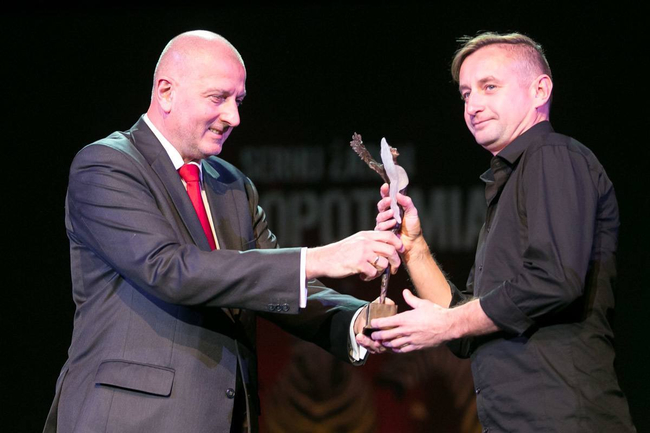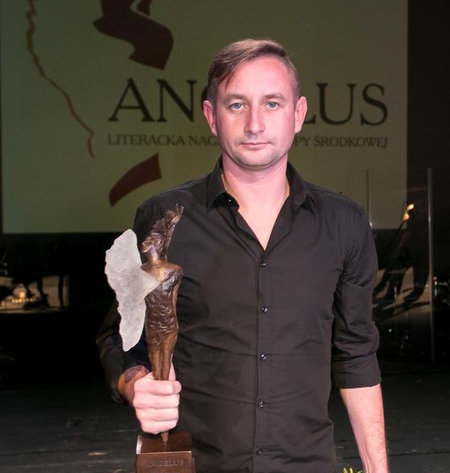The city of Wroclaw, Poland, became a literary hub again. Refined public gathered at Kapitol theater: writers, poets, publishers, translators, literary critics, and journalists. Tension is in the air: in just a few minutes the laureate of the Central European literary prize, Angelus, will be announced. This year it has been the 10th anniversary of the prize.
The nominees sit in the first row, in red velvet chairs: Jacek Dehnel, Drago Jancar, Andrzej Stasiuk, Ziemowit Szczerek, Lucian Dan Teodorovici, Olga Tokarczuk, and Serhii Zhadan. Amid rustling and shoving, at eight sharp, silence falls. On the stage begins a performance consisting of short dramatized episodes from each book, which change each other and create a single composition. When the head of the awarding jury, Mykola Riabchuk, comes on stage, the public is intrigued. And then: “The prize is awarded to… Serhii Zhadan!” Someone next to me utters a puzzled “wow,” something drops to the floor, and a storm of applause sweeps through the room. Zhadan, who has just flown in from Frankfurt, where he took part in the book fair, apparently cannot realize what is going on, and climbs the stage. He is wearing black from head to foot, and surprisingly, he has shoes on, not trainers. He begins reading, in a voice that makes hundreds of Ukrainian lady fans swoon. It is neither a poem nor a thank you speech. Actually, everything he utters sounds like poetry: his words are loud and rhythmical like drum roll.
“Dear friends, dear jury members, dear colleagues. Such awards are a very good occasion to draw attention to today’s most burning issues,” began Zhadan with a bunch of flowers, which someone had pressed in his hands. “Today several Ukrainian citizens are political prisoners in captivity in various jails on the territory of the Russian Federation. I mean Oleksandr Kolchenko, Oleh Sentsov, Nadia Savchenko, and others. I believe it is very important that Ukraine and entire Central Europe remember that these people are unlawfully deprived of freedom. I would like to use this opportunity to express my solidarity and support and dedicate this decoration that Ukrainian literature is honored with to them. I know that this year Oleh Sentsov and Nadia Savchenko have both had their books published. I wish that their books also get into the final of Angelus, so that they could come here and personally attend such a ceremony.” More applause, the ceremony is over, fuss, congratulations, taking photos.
“A SIGN OF ATTENTION FOR UKRAINIAN LITERATURE”
At his press conference, Zhadan will go on to say: “This award is a sign of attention for Ukrainian literature. It seems to me that now the main thing is to not let Ukraine face the aggressor and all that evil alone. It is good to have these signs of solidarity and support. They can be manifested on various levels: political, economic, etc. But culture is also an important component, and it must not be neglected.” In an exclusive commentary to The Day the Ukrainian poet and prose writer shares about what concerns him most. Upon return from the Frankfurt Book Fair, where the Ukrainian stand (and the trip) was organized exclusively thanks to the participants’ enthusiasm, Zhadan emphasized a grave problem: “We lack a purposeful cultural state policy. All the dialogs are initiated from the outside. The Frankfurt fair, where I just came from, is yet another sign of our state’s neglectful attitude towards its own image, its representation, or its culture in general. The entire stand, which was created by volunteers and activists, is a monument to Ukrainian society and a reproach to Ukraine’s state. In this country, citizens create the army, raise the economy, and develop culture. And it is beyond me what the state is doing in the meantime.”

Although Zhadan made attention for Ukraine, rather than his own merits, central in his speech, his book too deserves attention. The award-winning novel is Mesopotamia, and Kharkiv is the protagonist. On the one hand, it is portrayed in a rather realistic and concrete manner, which makes Kharkiv’s places, streets, and buildings easily recognizable; on the other, the narrative is rather universal, which makes it possible to discern the traits of any Central European city. “I have always found it fascinating to write about the landscapes which are largely absent from Ukrainian literature,” says Zhadan. “In general, the book is about love, tenderness, devotion, infatuation as such. And apart from all these things, it is about the city where I have lived for more than a quarter of the century now. It thrills me to be able to read in various other languages about the city I love. I am happy that this is the first book of poems to have won Angelus. It is partly a novel composed of novellas, and partly a collection of poems.”
Interestingly, due to this combination of prose and poetry, there were two translators of the book from Ukrainian. The main part of the book was translated by Michal Petryk (who received an award for the translator), and the poetic part was entrusted with a renowned translator Adam Pomorski. “I have translated a lot of his books, that is why I have some knowledge of his language,” said Petryk in a comment to The Day. “A good book is good to translate. I have been to Ukraine and to Kharkiv, and I can understand and feel the plot of the book.”
“IF ANYONE FROM UKRAINE IS TO GET A NOBEL, I BET IT WILL BE ZHADAN,” SAYS MYKOLA RIABCHUK
The choice of the jury, which this year included Stanislaw Beres, Piotr Kepinski, Ryszard Krynicki, Tomasz Lubienski, Krzysztof Maslon, Justyna Sobolewska, Miroslaw Spychalski, Andrzej Zawada, and Mykola Riabchuk, was quite unexpected. Tokarczuk had been considered the favorite. She is a Polish writer, known also in Ukraine, thanks to her Runners translated by Ostap Slyvynsky and her appearances at festivals. This year Tokarczuk has finished her opus magnum Jacob’s Scriptures, a text which was expected impatiently and which became unbelievably popular in Poland. Jacob’s Scriptures won her the prestigious Nike award just a week ago. This factor might also have influenced the jury’s decision: two awards in two weeks would probably be a little too much.
Tokarczuk’s book tells about an obscure period around the decay of the Polish-Lithuanian Commonwealth on the eve of its eventual division. This is the second half of the 18th century, which the author depicts as seen from a heretical schismatic movement in the Jewish community. As the head of the Angelus jury Riabchuk explained to The Day, the author builds the plot around this movement. Her protagonist Jacob, the leader of the movement, is a controversial figure, and it is hard to see if he is a true believer or a crook. “The only thing is, I believe, that Olga Tokarczuk has accumulated such a colossal material that she was reluctant to cut and abridge it,” notes Riabchuk. “She has stuffed too much of it in the book, to my liking, and there are many plot lines which lead to nowhere. But if the reader overcomes the first 200 pages, then intrigue begins. It is mighty good prose, I believe Olga Tokarczuk could have also won the prize.

In Riabchuk’s opinion, each book in the final is worth awarding; moreover, almost all books in the semi-final were worth a prize. You can imagine the competition: even Elfriede Jelinek, a Nobel laureate, failed to get into the top 14.
Among the other competitors were also Drago Jancar, who painted a panorama of life in Yugoslavia before and during the war (I Saw Her That Night), and Ziemowit Szczerek, well-known in Ukraine, with his book Seven. “He might be too young and seen as a literary teen,” muses Riabchuk, “his prose is a bit naughty and maybe, this holds the respectable jurors back. But I consider Szczerek a very promising author. This is not the high shelf prose so far, but it is smart read and is absolutely gripping.” By the way, Szczerek told The Day that he reads Zhadan and believes that he has long been playing an important role on the literary market: “Zhadan has written a lot of wonderful books, my favorite is the Anthem of Democratic Youth, a brilliant book. Mesopotamia depicts eastern Ukraine, it is a reverberation of reality.”
Polish writer Jacek Dehnel also ended up in the list of finalists with his Mother Makryna. “Dehnel writes apocryphal prose,” remarks Riabchuk. “His subject is the fate of Mother Makryna, a real historical figure, short of being canonized. Polish classics referred to her. She was a model of a Basilian nun who did not give in to the pressure of the Russian regime following the division of Poland, when the Uniate church was banned in Russia. Dehnel depicts the sufferings the nun experienced, the persecution she had to endure, and so on. However, Karel Capek would have simply made it into short apocrypha.”
Another nominee was Andrzej Stasiuk with his book East. “I was very much in doubt,” admits Riabchuk. “I like Stasiuk very much, especially East. This is a book of essays, but it offers a panoramic vision of the metaphysical East as a symbol of backwardness and forlornness, and also of childhood.”
Romanian author Lucian Dan Teodorovici with his Matei Brunul. He got the readers’ prize, Natalia Horbanevska award (only two years ago she was the head of the Angelus jury). “Teodorovici’s book is a cross-section of the life in Stalinist, totalitarian Romania, where the dictatorship assumed one of the wickedest forms. It is a very informative and kind book. I could say a lot of good things about each of them,” continues Riabchuk. “However, Zhadan was by far the best. He combines incredible things: sublime, piercing poetic nature and the existential feeling of the scantiness of life when it comes to life’s secrets. This is a very well written piece of prose. The contrasts provide colossal effects: on the one hand, you have this prosaic daily routine, not too attractive and sometimes even criminal, and on the other, some poetic achievements. This is minimalistic style. I consider him a brilliant writer, and if anyone from Ukraine is to get a Nobel, I bet it will be Zhadan. Here I had not a grain of doubt, most of the people supported his nomination. The fact that he represents a different Ukraine, little known in Poland, might also have been a factor. This is eastern Ukraine, but most importantly, it is urban eastern Ukraine. Traditionally, if we have an author who writes about a city, it will be a Galician city, or Kyiv. Or it will be rustic farm prose. Eastern Ukrainian urban discourse is absent from Ukrainian literature. Zhadan’s prose is good, quality literature. And in my view, he is a writer with a European perspective. Moreover, with a global perspective.” Thus Zhadan won with six votes against three, leaving other contestants behind. A couple of hours after the award ceremony Zhadan carried the statuette by Ewa Rossano and 150,000 zloty back to Frankfurt, where he will keep working and sharing about himself and Ukraine.








